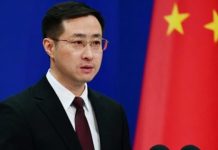Foreign Desk Report
NEW YORK: UN Secretary-General António Guterres has said that the world was running out of time to limit global temperature rise to below two degrees Celsius, saying that it was a matter of life or death for climate vulnerable countries.
Speaking to the first Climate Vulnerable Finance Summit of 48 nations systemically exposed to climate related disasters, the UN chief said they needed reassurance that financial and technical support will be forthcoming. “To rebuild trust, developed countries must clarify now, how they will effectively deliver $100 billion dollars in climate finance annually to the developing world, as was promised over a decade ago”, he said. The UN chief said that to get the “world back on its feet”, restore cooperation between governments and recover from the pandemic in a climate resilient way, the most vulnerable countries had to be properly supported.
Guterres asked for a clear plan to reach established climate finance goals by 2025, something he promised to emphasize to the G20 finance ministers at their upcoming meeting this week.
He added that the development finance institutions play a big role supporting countries in the short-term, and they will either facilitate low carbon, climate-resilient recovery, or it will entrench them in high carbon, business-as-usual, fossil fuel-intensive investments. “We cannot let this happen”, he said.
The Secretary-General reminded that the climate impacts we are seeing today – currently at 1.2 degrees above pre-industrial levels – give the world a glimpse of what lies ahead: prolonged droughts, extreme and intensified weather events and ‘horrific flooding’.
“Science has long warned that we need to limit temperature rise to 1.5 degrees. Beyond that, we risk calamity. Limiting global temperature rise is a matter of survival for climate vulnerable countries”, he emphasized. The UN chief highlighted that only 21% of the climate finance goes towards adaptation and resilience, and there should be a balanced allocation for both adaptation and mitigation.




